There are no two ways about it, it’s been a sensational year for Caleb Clarke.
After all, the 21-year-old wasn’t expected to play much of a role in any fifteen-a-side team, be it Auckland or the Blues – let alone debut for the All Blacks.
Instead, Clarke was focusing full-time on sevens with one eye firmly set on the Tokyo Olympics, which were due to kick-off in July.
The coronavirus had other plans, however, and Clarke soon found himself buckling down in camp with the Blues.
“I was working hard, practically living in Tauranga, just wanting to set the goal of playing at the Olympics in July,” Clarke told The XV. “Then Covid came on by and sort of changed everything.
“The first lockdown [in late March], the world pretty much shut down. Sevens was on the rocks and our leaders were saying, ‘You know what boys, take this lockdown as a full-on break and we’ll come back together afterwards, train hard and we’ll whip you back into shape.’”
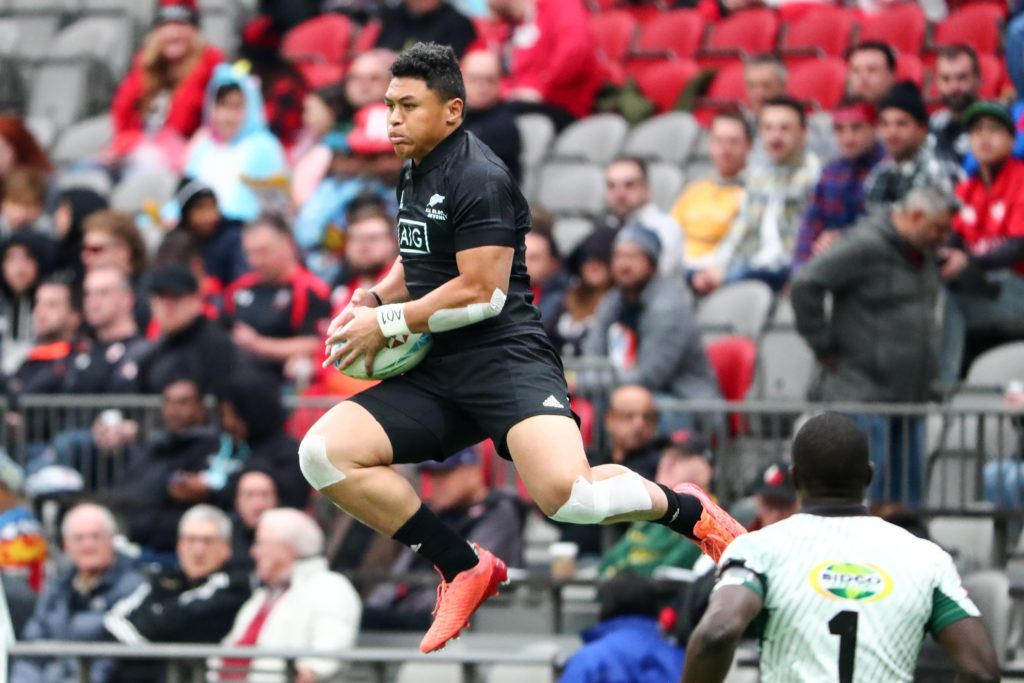
Sevens lives and dies by international competition. While local tournaments can capture some interest here and there, the real investment is in World Rugby’s Sevens World Series, as well as major events such as the World Cup, Commonwealth Games and Olympics.
Of course, international competitions have been few and far between in 2020 and once the extent of the pandemic was realised, the call was made to wrap the World Series up early and push the Olympics out to 2021.
Suddenly, men such as Clarke had gaps in their calendars.
“After we were told that we could take a break during the lockdown, I was like, ‘Yo, sweet’ – I put on eight kilos! My parents were giving me lots of chocolate and stuff, which didn’t help.
“Probably a week-and-a-half before the Super Rugby pre-season was going to start for the Aotearoa competition, [Blues head coach] Leon [MacDonald] rang me and told me I was coming back because sevens wasn’t happening anymore this year. I was so scared.
“I ran a bronco [an intense fitness test] to see how unfit I was and I was over five minutes. I’m always an under five minutes kind of guy. I was thinking, ‘This isn’t going to go well.’
“I didn’t have much time to get back to full fitness after that first lockdown but our trainers at the Blues really whipped me back into shape before that first game with the Hurricanes.”
After we were told that we could take a break during the lockdown, I was like, ‘Yo, sweet’ – I put on eight kilos!
Caleb Clarke
Despite his young age, Clarke had already accrued 13 Super Rugby matches in 2018 and 2019 and spent much of the latter half of 2019 parked on the wing for the Blues. Before the initial Super Rugby competition was called off, however, the likes of Mark Telea and Joe Marchant had performed admirably in the Blues’ outside backs – which meant a starting spot wasn’t guaranteed for Clarke.
But coach MacDonald injected Clarke right back into the team and the 21-year-old instantly made an impression on the left wing against the Hurricanes, notching up more than 100 metres on attack and touching down for a well-taken try.
From that point, Clarke became an instant pick for the Blues when available, and the young wing went from strength to strength and received a well-earned All Blacks call-up later in the season.
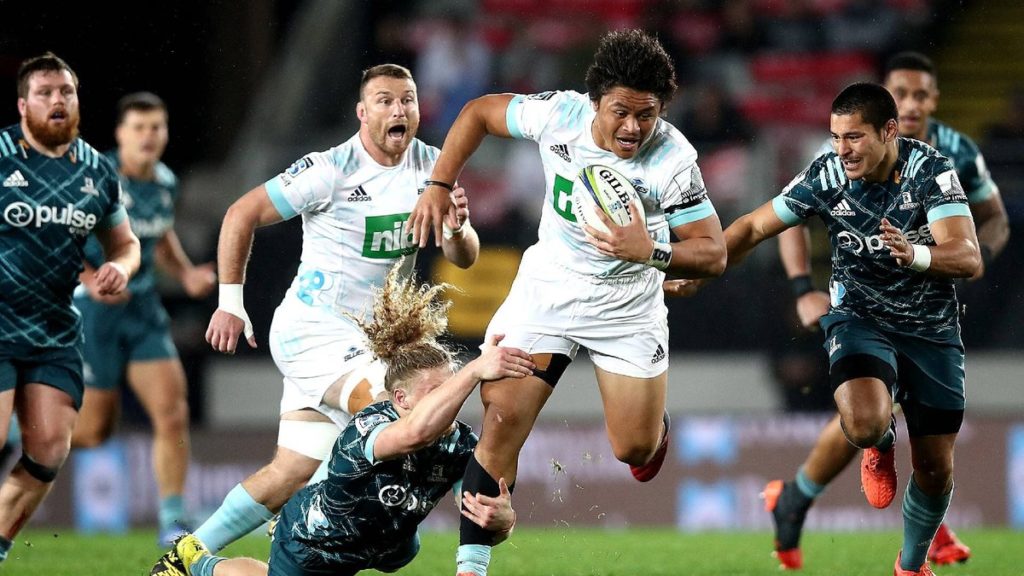
It’s been a season of highs for Clarke and were the World Rugby Awards going ahead in 2020, he’d be a worthy pick for Breakthrough Player of the Year.
On the field, Clarke amassed six appearances for the Blues and five Tests for the All Blacks and, prior to the series’ cancellation, featured in three tournaments for the All Blacks Sevens team, who were eventually crowned champions.
Off the field, however, Clarke has also rubbed shoulders with some of the best players in the game and put himself in better stead for the future.
Coach MacDonald injected Clarke right back into the team and the 21-year-old instantly made an impression on the left wing against the Hurricanes, notching up more than 100 metres on attack and touching down for a well-taken try.
The big news for Blues supporters heading into the season, of course, was that Beauden Barrett was shifting north from the Hurricanes. Clarke was as excited about the 2016 and 2017 World Player of the Year’s arrival as any fan of the team.
“I was so nervous meeting him,” Clarke said. “I’d never met him before, the world’s best player. I was just like, ‘No way, this guy’s at the Blues!’ So it was really cool for me.
“I was actually warming up next to him and my warm-up was so slow, it was just jogging, and he fully ran one rep of a bronco, sprinting the whole thing. It was making me tired just watching him.”
Barrett didn’t join the team in a full-time capacity until after the Covid-enforced break and not long after the All Blacks utility back arrived on the scene, the Blues brought another former Player of the Year into their ranks – the legendary Dan Carter.
“When [Carter] first came in, all of us were just like, ‘Oh my gosh, it’s Dan Carter, it’s the Dan Carter – the guy we used to watch as kids!’ He just made it so easy for us to get along with him,” Clarke said.
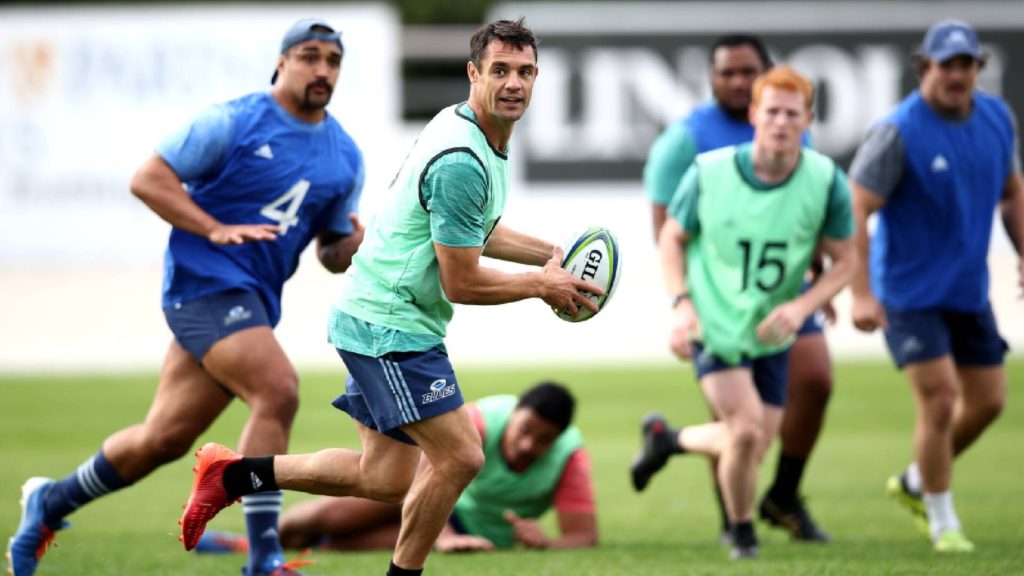
“He’s just like one of the boys, that was such a cool thing. He was always into what we were into, he was always asking us about our lives and stuff like that. It was just real cool to see someone so high up in the rugby world really showing how passionate he is about people and what they’re into, asking how their family are. Just showing that the higher you go up, you’re still the same person.
“[Barrett and Carter] are such awesome guys and it was awesome how they always have the time to connect with people, not just know them on a name basis but know their family, know their interests – just really showing that they care about who you are as a person.”
As late additions to the squad, Clarke and Carter were both assigned to the smaller Blues changing shed – which gave the young wing plenty of opportunities to pick the senior fly-half’s brain about everything from rugby to off-field investment.
When [Dan Carter] first came in, all of us were just like, ‘Oh my gosh, it’s Dan Carter, it’s the Dan Carter – the guy we used to watch as kids!
Clarke on one of his childhood heroes who became a team-mate
As quickly as the Super Rugby Aotearoa competition kicked off, the tournament was wrapped up with the Crusaders being crowned winners – and Clarke soon found himself knocking boots with current senior All Blacks after what was, in hindsight, a fairly sensible call-up to the national team.
Clarke debuted off the bench in the All Blacks’ opening game of the year then was quickly brought into the run-on side after incumbent left wing George Bridge was invalided for the season due to a serious pectoral injury.
Having not expected to play much of a role at even the Blues in 2020, suddenly Clarke found himself as the starting left wing for the All Blacks – it truly was a whirlwind season.
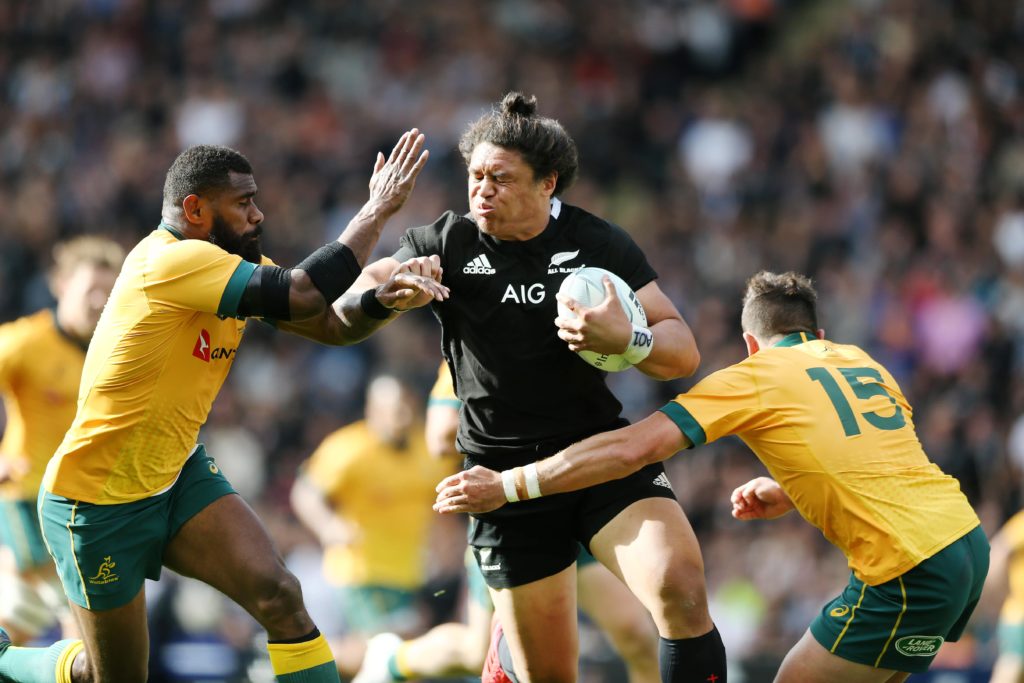
With the good came the bad, however. While the name Caleb Clarke may have rung a few bells last year, the young outside back is now a household name, and with the weight of fame comes the weight of expectation.
In Clarke’s first game for the All Blacks, played in dire conditions in Wellington, the debutant knocked the ball on after it bounced off New Zealand’s posts from a Wallabies penalty kick, almost three minutes into injury time with the scores locked at 16-16.
While the All Blacks were able to hold the Wallabies out and ultimately launch an attack of their own, no further points were scored and the match ended in a draw. It was, as Clarke put it, a “rollercoaster” of a debut.
“When they got that penalty on halfway, I was hoping that one would miss, and it did, but I ended up dropping that ball off the posts, so at first my heart sank,” Clarke said following the match.
“The first thing I actually thought was, ‘Did I just lose us the game?’, but then we fought back, defended our line really well. I was just hoping we weren’t going to get penalised.
“Then the turnover happened, and then [we] were just keen to attack, just wanted to get that first win, and I thought we were when we were right on their line, so it was quite the emotional rollercoaster, for me personally.”
Despite Clarke’s excellent performance off the bench – 56 metres run and four beaten defenders – it’s telling that the young wing admitted after the game that the moment that stands out is the minor mistake, and evidence of the intense pressure that Clarke and his fellow All Blacks are under.
“The first thing I actually thought was, ‘Did I just lose us the game?’, but then we fought back, defended our line really well. I was just hoping we weren’t going to get penalised.
Clarke on his debut for the All Blacks
“It’s pretty surreal when you do something, when you achieve such a big goal in your life. It’s a big process to work towards that thing, so I’m still buzzing,” he said.
“The one thing that sticks out for me, though, is dropping that kick off the posts, that last penalty.”
After that initial blip, Clarke didn’t put a foot wrong in the weeks following and helped the All Blacks lock down the Bledisloe Cup for another year. There was still pain to come, however. New Zealand’s first-ever loss to Argentina – and Clarke’s first-ever loss in the black jersey – was particularly gut-wrenching.
“I took that loss against Argentina really hard,” Clarke told The XV. “It was so bad, I ended up crying in the changing rooms. I had to hold it all together on the field and then I got into the changing room and started crying because I felt like I didn’t play well and I thought I let down the whole of New Zealand. That’s the part that people don’t see a lot of the time.”
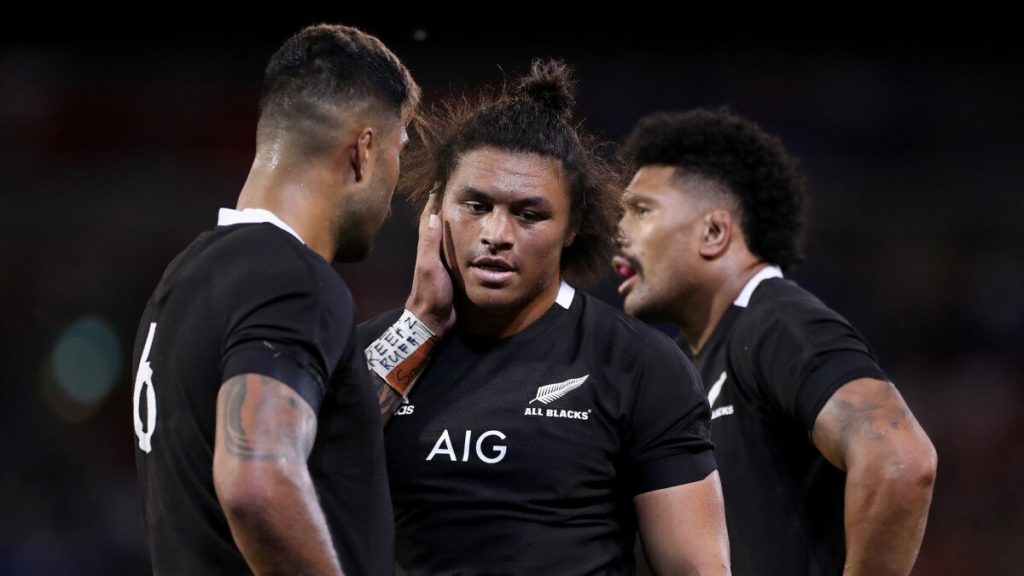
Clarke had plenty of support from his team-mates who ably consoled their young colleague in the sheds.
“Alex Hodgman, he saw me first, and he was comforting me and that was really helpful. It got me to stop crying, which was good. Then TJ Perenara came up to me after Alex and I was still trying to get myself together. He talked to me and he really helped.
“I was representing the All Blacks, New Zealand’s national team, and that’s why I felt like I’d let down the whole of New Zealand. But he came up to me and was like, ‘Remember who you are. You’re more than just a rugby player. This is a game we love and we play so of course we feel disappointed but don’t make your identity all about being a rugby player.’
“It really put into perspective how much experience TJ has and that I’m more than just a rugby player. I can feel the disappointment, but I don’t have to put everything into this. It helped so much and really put a lot of things into perspective. I’m just really grateful for seeing TJ after the game.”
That’s helped Clarke with his goal-setting for the coming season, where he hopes to strike the right balance between rugby and everything outside of the game – and it’s why he’s also looking forward to a well-earned break after a real slog of a season that’s been running for well over a year.
An Olympic gold medal is still a huge carrot for Clarke and may well convince him to lace up the boots for the New Zealand Sevens side again next year but no decisions have been made as yet – that’s a job for next year.
“I’m honestly just really looking forward to this time off now – that’s what my next focus is, having a good break, spending time with family, spending time with friends, maybe getting out of Auckland and seeing New Zealand.”
It’s the sort of stuff that any young Kiwi would want to do over summer and one more reminder that despite his black jersey, Caleb Clarke is still just a 21-year-old trying to navigate the turbulent transition from one period of his life to another – even if he is now a household name.


Comments
Join free and tell us what you really think!
Sign up for free